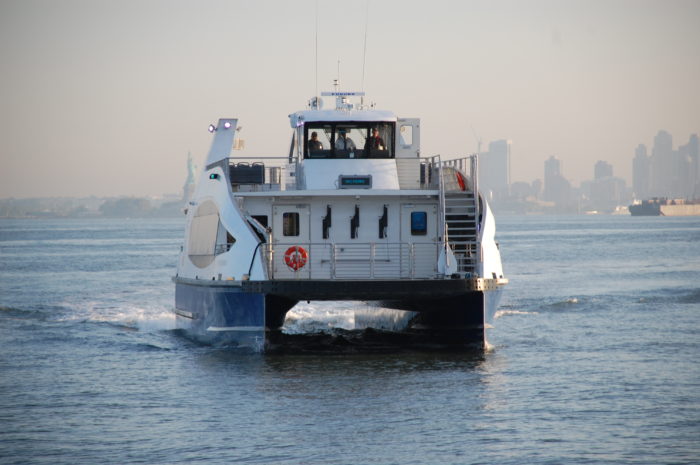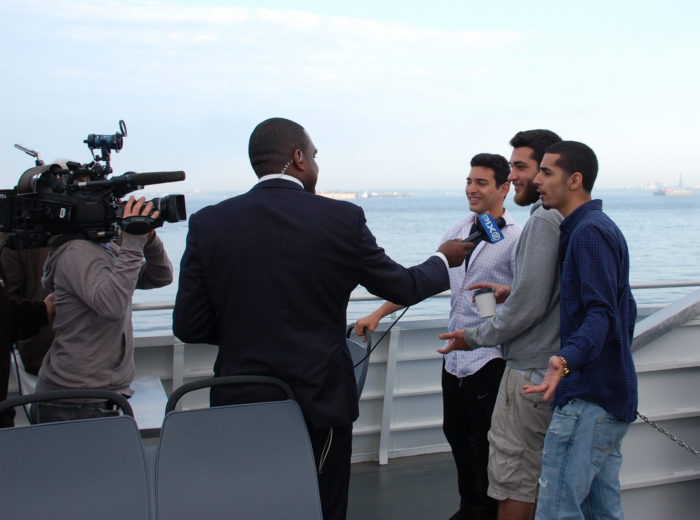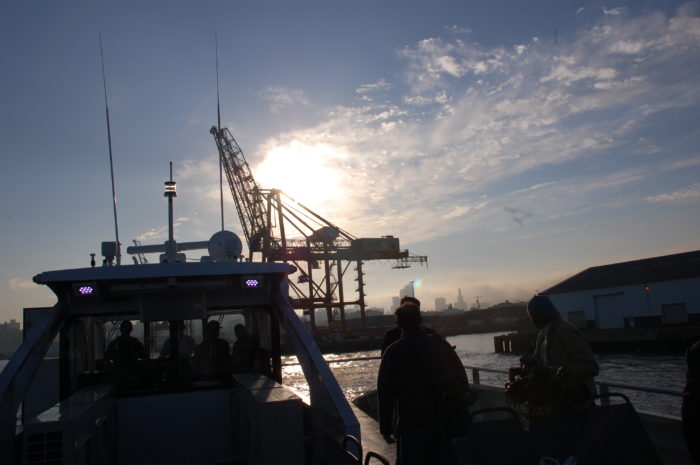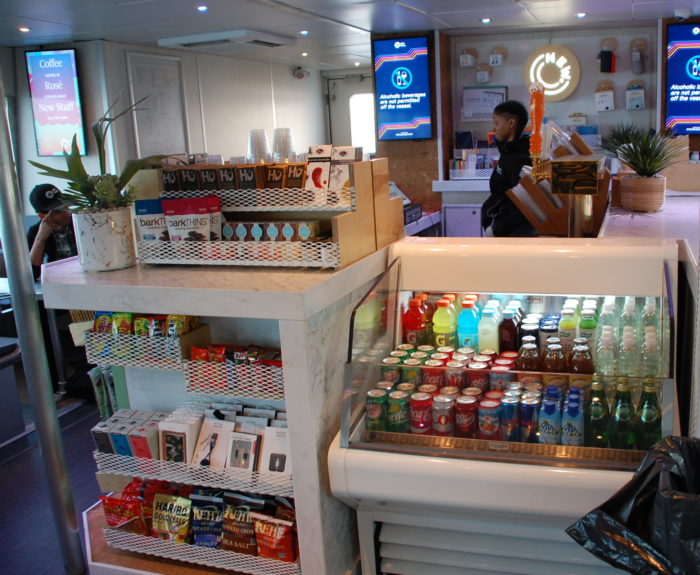On Board the First Run of the South Brooklyn Ferry
Despite earlier complaints about overcrowding and late boats, the NYC Ferry's newest route gets off to a timely start
On the first run of the South Brooklyn ferry, the 6:30 a.m. boat pulls up to the pier in Bay Ridge (Photos by Steve Koepp)
As the fledgling NYC Ferry prepared for this morning’s launch of its new South Brooklyn route, conditions seemed ominous. A heavy fog was forecast, and complaints about overcrowding and late boats over Memorial Day weekend were dogging the operation as well. But when the first ferry, dubbed the Lunch Box, pulled away from the pier at Bay Ridge only a few seconds past its 6:30 a.m. departure time, the haze was lifting and service was shipshape. In fact, the dozen or so bleary-eyed passengers were outnumbered by people watching over them: TV crews, security officials, spokespeople, maritime experts, and crew members.
The most celebrated riders on the first run were a trio of youths from Bay Ridge, Suliman Abed and two companions, who had decided to stay up all night to catch the first ferry from their neighborhood. “We were bored and figured, might as well check it out,” he said. At about 6:10 a.m., Abed bought a paper ticket at the pier’s vending machine and declared it “the first ticket,” which inspired hovering TV news crews to line up for interviews with the trio. Nearby, passenger Tom Grommell of Bay Ridge said he’s welcoming the new ferry service as a way to skip his usual commute on the R train to his office on Manhattan’s Fulton Street. “I’m excited. I think it’s an interesting alternative,” he said. “This time of year, it’s nice. You’re above the ground, you get to see the water.”

Suliman Abed, far right, and two companions from Bay Ridge were among the first to board the first run of the new route
The South Brooklyn route, the third one to open in the new NYC Ferry system, makes stops at Bay Ridge, Sunset Park, Red Hook, Atlantic Avenue, Dumbo, and Wall Street. For Brooklynites in neighborhoods underserved by mass transit, the line could be a blessing (at a ticket price of $2.75, the same as a subway trip). The ferry ride from Red Hook to Wall Street, for example, is only 21 minutes, according to the ferry schedule.
Yet during the first month of service on the two inaugural routes, the East River and Rockaway lines, the system suffered from overcrowding at peak times. NYC ferries carried 243,000 passengers in May, about 93,000 more than expected. Long lines and delays reached a crescendo over Memorial Day weekend, when more than 26,000 passengers rode the ferries in just two days, city officials said. Hornblower Cruises & Events, the San Francisco company hired by the city to run the ferry, responded by adding more boats to the system. “Demand has been incredible,” said Joshua Knoller, a spokesman for NYC Ferry by Hornblower. “We’ve made some minor scheduling adjustments to help enhance service and the new connections being created with the addition of the South Brooklyn route.”

The South Brooklyn route offers gritty but dramatic industrial waterfront scenery
The episodes of overcrowding have led to predictions that Mayor Bill de Blasio, who has championed the new system, is going to need a bigger boat, or several of them. The ferries currently in operation have a capacity of 150 riders. Appearing in Red Hook on Wednesday to launch the South Brooklyn line, de Blasio called it “a blessing” that the system has been so popular and promised to keep making adjustments as needed. “Absolutely ready to add boats of the current size if needed, but if we come to the conclusion in the coming weeks that bigger boats are called for–again, good problem to have–we will get those bigger boats.”
Operating an urban system as large as NYC Ferry is scheduled to become, with an expected 20 boats in service by next year, is a step up for Hornblower. The company started in 1980 as a two-yacht charter service in Berkeley. It has grown over the decades to command a fleet of dozens of sightseeing and charter boats serving attractions like Alcatraz Island in San Francisco Bay and the Statue of Liberty and Ellis Island. To keep up with the demand for NYC Ferry service, Hornblower had to charter an extra boat from a rival, New York Waterway, the Daily News reported.

Concession stands on the boats offer snacks, drinks, and even phone-charger cords
The crush of sightseeing riders on Memorial Day weekend served as a heads up that NYC Ferry probably has a summer hit on its hands—and will need to deal with it. “If you build it, they will come,” said Knoller. “The price point is attractive, the boats are just spectacular, and everybody gets a seat.” The air-conditioned boats have snack bars, serve wine, and offer seating both indoors and on the upper deck.
City officials think the boats will help lure tourists out of their usual haunts in Manhattan, encouraging them to explore the outer boroughs. “We really believe it’s going to be an economic boost to a lot of neighborhoods in Brooklyn and Queens,” said Anthony Hogrebe, a senior vice president for the NYC Economic Development Corp., which supervises the ferry for the city. The system is expected to create about 200 new jobs, he said, including captains, deck hands, ticket sellers and other employees who are still being hired. (Read about one of the captains here, and about the simulator they use for training here.)
Passengers can help keep the boats running on time by downloading the NYC Ferry phone app, which speeds boarding, said Knoller. So far, about 50% of tickets have been sold through the app, though passengers can also buy tickets at the vending machines on the docks and from agents on board, if necessary.










